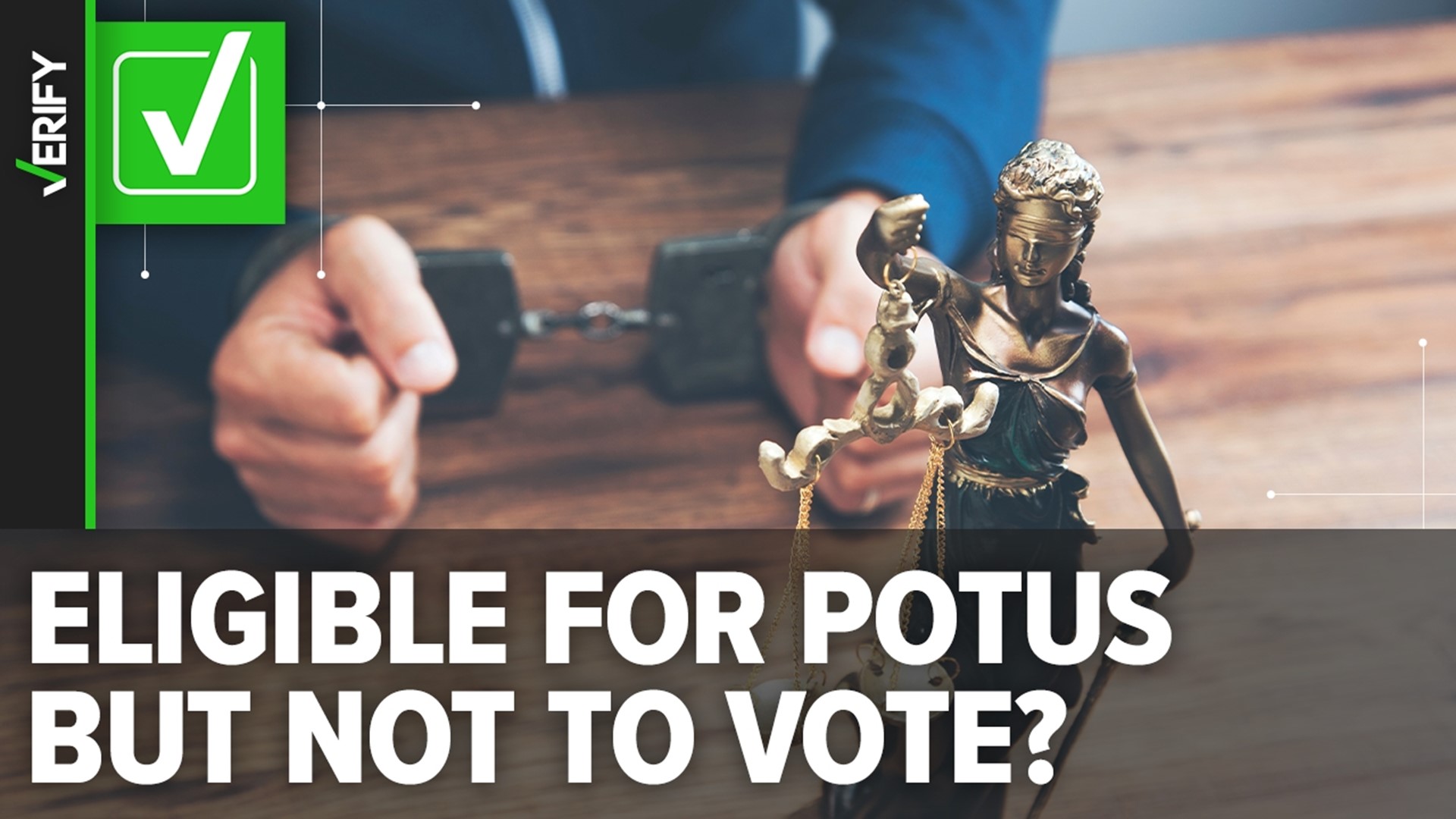On Aug. 1, former President Donald Trump was indicted on charges related to his attempts to overturn the results of the 2020 election.
According to the indictment, Trump was charged with conspiracy to defraud the United States, conspiracy to obstruct an official proceeding, obstruction of and attempt to obstruct an official proceeding, and conspiracy against rights.
Trump is currently facing charges in two other criminal cases: A hush money case in New York and a federal case related to the mishandling of classified documents in Florida.
The charges come in the midst of his campaign to take back the White House in 2024.
A VERIFY viewer recalled that some convicted felons are not allowed to vote, and wanted to know whether it’s possible to be ineligible to vote but still be allowed to run for president.
THE QUESTION
Can convicted felons run for president, even if they can’t vote?
THE SOURCES
THE ANSWER
Yes, convicted felons can run for president even if they can’t vote.
In some states, people convicted of certain felonies lose their right to vote, either temporarily or permanently. But the Constitution alone decides who is eligible to run for federal office, and it does not bar people with criminal records from doing so.
WHAT WE FOUND
The U.S. Constitution leaves it up to states to decide who is eligible to vote.
In all but two states – Maine and Vermont, plus the District of Columbia – people in prison for felony convictions are not allowed to vote. Some states return voting rights to those people as soon as they leave prison. Others require them to complete their full sentence – including parole, probation, and paying any fines issued – before they regain their voting rights.
Several states, such as Florida, Virginia, and Iowa, go further and require that for certain crimes – usually the most violent ones like murder and rape – convicted felons lose their right to vote forever. These states have various processes by which such people can apply to have their rights restored, most commonly by requesting a pardon from the governor.
When it comes to running for elected office, many states have laws saying that only people who are eligible to vote are eligible to run for state or local office, effectively prohibiting felons from seeking those offices until they meet the requirements of that state for regaining voting rights.
Some have laws specifying that people convicted of certain crimes are ineligible to run for office, even if they otherwise meet eligibility requirements. For instance, in California people found guilty of certain corruption-related charges have to obtain a pardon from the governor before they can run for state or local office.
But the sole authority on who can run for federal office – president, vice president, senator, or representative – rests with the U.S. Constitution.
The Constitution lays out just three requirements to run for federal office: age, citizenship and residency.
Representatives have to be at least 25 years old, senators at least 30, and the president and vice president at least 35. Representatives have to have been a U.S. citizen for at least seven years, senators at least nine, and the president and vice president must be naturally-born citizens. Representatives and senators must currently live in the state they represent; the president and vice president must have lived in America for at least 14 years.
Supreme Court rulings have confirmed that neither states nor Congress have the legal authority to add additional requirements. Any further restrictions on who can run for federal office would have to be instituted via a Constitutional amendment.
That means even if they can’t vote, and can’t run for state office, most people convicted of felonies remain eligible to run for president as long as they meet the rules laid out in the Constitution.
There are a few additional restrictions on who can run for federal office, which are specified in Constitutional amendments.
The 22nd Amendment imposed term limits on the president, disqualifying from candidacy anyone who’s already served two terms in office.
The 14th Amendment states that anyone who held sworn public office and violated their oath to uphold the Constitution by “[engaging] in insurrection or rebellion… or given aid or comfort to the enemies [of the Constitution” is ineligible for any public office unless Congress grants them amnesty with a two-thirds vote of both houses. The amendment was passed at the close of the Civil War, but the disqualification clause saw fairly limited usage as a few years later Congress voted to grant sweeping amnesty to most Confederate veterans. Modern attempts at enforcement following the January 6th attack on the Capitol have seen mixed results.
People convicted of felonies have run for federal office before. In 1920, socialist candidate Eugene Debs famously garnered nearly a million votes from a prison cell, where he had been sent after being convicted of sedition for criticizing American involvement in World War I. Campaigns from prison naturally rely heavily on staff, and candidates do not receive special treatment and therefore have limited communication with the outside world.

